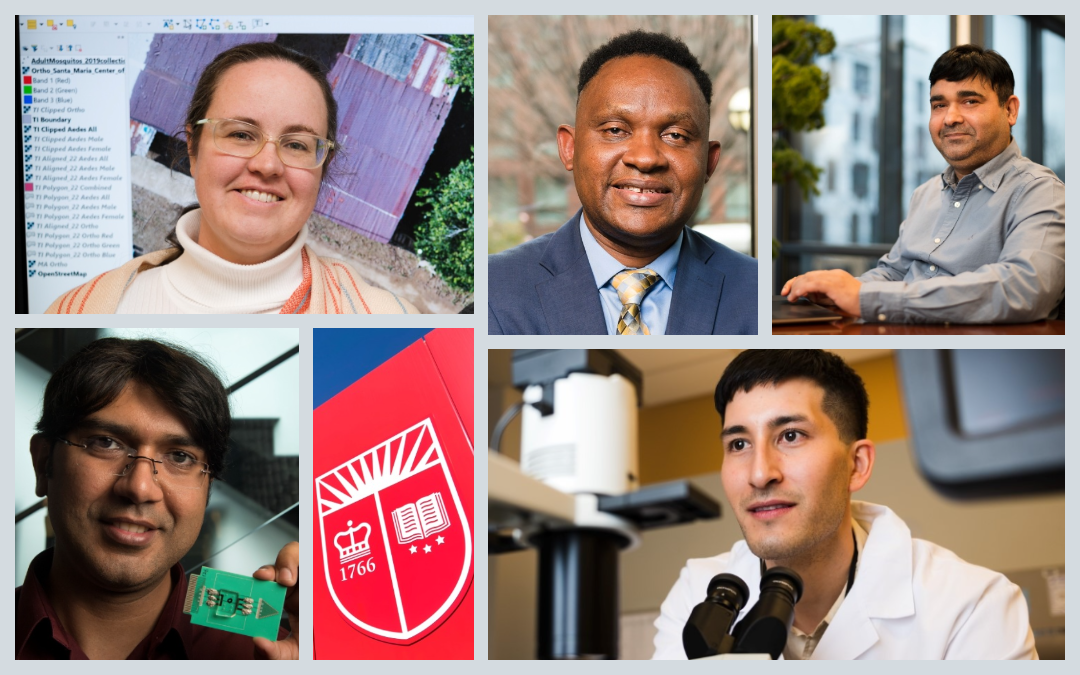The principal faculty of Rutgers Global Health Institute are innovators.
They lead research involving nanoparticle drones used in cancer treatment and aerial drones to detect breeding mosquitoes that threaten to spread disease. They engineer blood tests and evaluate breath tests to decode the inner workings of human body systems.
Through this work, they are confronting diverse global health challenges – the critical issues that affect everyone, and the complex problems that are especially detrimental to the most vulnerable among us.
Support for Faculty Research Is Support for Health Equity
All over the world, there are tremendous disparities in access to care and in the conditions that make good health possible. At Rutgers Global Health Institute, we are focused on responding to such health inequities in ways that make a tangible impact, some of which are highlighted below.
With additional support – such as funding that’s made possible by philanthropic donations to Rutgers Global Health Institute on Rutgers Giving Days, happening March 20 through 24 – our faculty can do even more for our collective pursuit of health for all.
Impact on children’s health
Gwenyth Lee is an assistant professor of global health and epidemiology. Her research explores the compounding impacts of multiple early-life exposures on child development in low- and middle-income countries.
Even when Gwenyth Lee is at a research site in Ecuador, she’s thinking about how her work is applicable to the health of children everywhere. For example, by investigating how children’s growth and development are impacted by enteric (diarrheal) infections and undernutrition, she is addressing public health issues that affect vulnerable populations in various locations ranging from rural to urban.
One of Lee’s focus areas is studying the gut microbiome of infants and biomarkers of gut function to understand how enteric pathogens may impact nutrient absorption, child growth, and child development. Her work involves the use of breath, fecal, and blood tests to identify indicators of intestinal inflammation and disease, and she examines these findings in relation to other biological, environmental, and social factors. She is currently a co-investigator for longitudinal birth cohort studies in northern coastal Ecuador.
“I’m working very closely with a lot of different people throughout these communities, and we’re contributing to what I consider to be gradual changes in our larger global health system,” Lee says. Whether it’s a new method for evaluating the consequences of intestinal permeability on child metabolism or studying how a community’s road access affects its food-sharing social networks, Lee is pursuing pathways for impact in numerous areas of child health research.
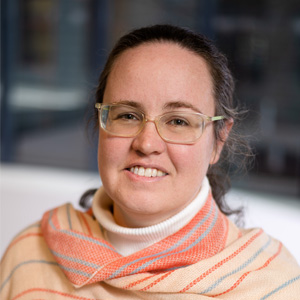
Gwenyth Lee
Impact on infectious disease preparedness and response
Bobby Brooke Herrera is an assistant professor of global health and medicine. He conducts multidisciplinary research on epidemic viruses and infectious diseases.
Bobby Brooke Herrera is immersed in hands-on research that aims to accelerate the development of diagnostics, vaccines, and therapeutics for global infectious diseases. It’s a complex field of study, and Herrera’s lab is focused on a particular dynamic: asymptomatic viral infection. This occurs when an individual infected with a virus – such as Zika, Ebola, or SARS-CoV-2 – develops little to no symptoms of the actual disease or illness.
Through this research, Herrera and his team are uncovering highly nuanced information about the human immune system’s molecular underpinnings, which he says is “critical knowledge for creating the right tools to combat infectious diseases.”
His rigorous lab research dives deep into hypotheses about what makes some human antibodies or T cells more effective than others, which may influence whether a person becomes ill. “It could be genetics, environmental factors, or reasons related to the virus itself. However, we believe pre-existing immunity plays an important role in protection against severe disease,” Herrera says. “For the world to be better equipped to deal with deadly disease outbreaks, we need reliable testing, accountable vaccines, and more potent therapeutics. The knowledge we are producing at Rutgers is going to help us get there.”
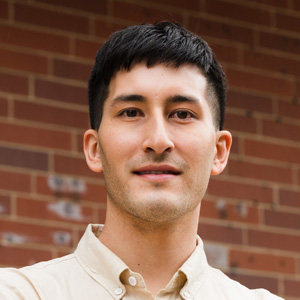
Bobby Brooke Herrera
Impact on cancer in Africa
Wilfred Ngwa is a professor of global health and radiation oncology. He develops technologies that integrate with radiation therapy to increase access to cancer treatment and reduce health disparities. He also is chair of the Lancet Oncology Commission on cancer in sub-Saharan Africa.
About 70 percent of global cancer deaths occur in low- and middle-income countries – and the disparity is worsening. There is a dire need to reduce cancer treatment times and costs in these resource-limited settings, such as in sub-Saharan Africa. Wilfred Ngwa is heeding the call.
Ngwa leads a research group that is developing low-cost and efficient technologies that integrate with radiation therapy. One such technology incorporates artificial intelligence and smart radiotherapy biomaterials, such as nanoparticle drones that can be injected intravenously and will emit missile-like electrons when activated by photon beams during treatment. This process is designed to increase damage to cancerous tumors while minimizing toxic effects on body tissues. This technology also can be programmed to sustainably deliver cancer-fighting immunotherapy drugs.
People everywhere – no matter what their socioeconomic status or their local health system’s existing resources – could benefit from the highly efficient cancer treatment technologies that Ngwa is developing. Reducing treatment times and costs would have a positive ripple effect throughout health care.
The impact in sub-Saharan Africa, where Ngwa focuses much of his global oncology work, could be tremendous, he says. In this region, there are many barriers preventing patients from receiving timely and comprehensive cancer care. For example, delays in diagnosis – due in part to oncology workforce capacity issues, such as not enough specialty-trained health care personnel, limited diagnostic equipment, and insufficient pathology services – mean that patients might be waiting weeks or months to begin their cancer treatment.
“Time is of the essence for people who are navigating cancer care,” Ngwa says. “I am focused on research that will allow more people to get the care they need and deserve, when they need it – no matter where in the world they live – and that includes the targeted care that is possible when the right resources are in place.”
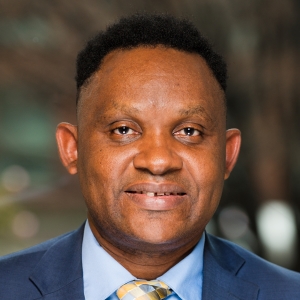
Wilfred Ngwa
Impact in disease hotspots
Ubydul Haque is an assistant professor of global health and epidemiology. He conducts geospatial research for predicting locations of infectious disease outbreaks and examining climate-related health hazards.
Knowledge is power. That’s why geospatial epidemiologist Ubydul Haque is committed to using “big data” for the public good, particularly in resource-limited communities around the world.
Haque conducts data-based research for predicting locations of infectious disease outbreaks and examining climate-related health hazards. His work supports the development of targeted public health interventions for communities to address their specific health-related needs.
For example, many regions of the world are vulnerable to outbreaks of dengue fever, an infectious viral disease transmitted by mosquitos. The risk can vary from one neighborhood to another and change over time, due in part to environmental, socioeconomic, and individual behavior factors. To help local officials better understand their communities’ situations – which then enables their mosquito control programs to be more focused and resource-efficient – Haque is developing an agile dengue outbreak response system. This system incorporates drone-based surveillance to detect mosquito breeding sites and mobile app-based rapid communications. It produces real-time information to help with decision-making, such as where exactly to deploy fogging.
“Resource limitations are widespread in our world, but we’re also experiencing unprecedented advances in technology,” Haque says. “I’m eager to help meet the need for data-driven solutions for complex global health problems.”
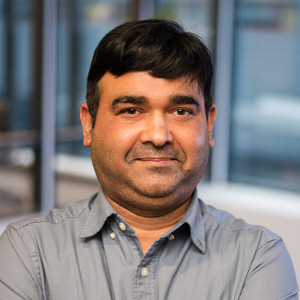
Ubydul Haque
Impact on health workforce capacity
Umer Hassan is an assistant professor of electrical and computer engineering and global health. His research includes developing point-of-care biosensors that can be used to detect, monitor, and evaluate infectious disease dynamics.
The World Health Organization identifies the serious shortage of health workers around the globe as one of the most critical constraints to the achievement of health and development goals. At Rutgers, Umer Hassan is intervening through innovation.
Hassan’s biomedical research incorporates electrical and computer engineering to solve pressing global health problems, which include health workforce capacity challenges that negatively affect the delivery of health care, especially in vulnerable communities.
For example, Hassan has designed a biosensor-enabled medical device that can be used at a patient’s bedside to detect and monitor a septic infection, which is a life-threatening condition that demands a rapid, coordinated response. Only minimal training is required for health care providers to use Hassan’s inexpensive point-of-care device, meaning that more people – not just specialty-trained clinicians – could help manage sepsis patients. In resource-limited settings, this expansion of health workforce capacity could mean the difference between life or death for patients who require scrutinous medical care.
Other biomedical technologies that Hassan is developing would improve health care providers’ abilities to understand, at the individual level, how a person’s immune system responds to disease-causing pathogens, such as bacteria and viruses. “Personalized medicine is the new frontier in health care,” Hassan says. “My lab’s research and development goals include creating new technologies that will lead to more accurate clinical responses, and more resource-efficient processes, for treating infectious diseases. This is how we can save more lives in more places around the world.”
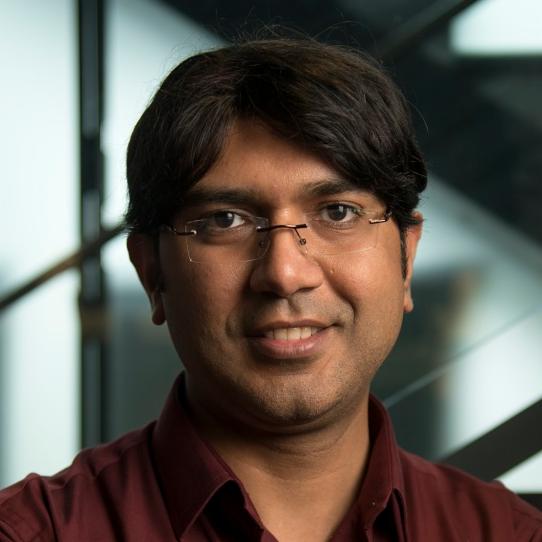
Umer Hassan
Make a Difference in Global Health
Your support will help Rutgers Global Health Institute faculty confront diverse global health challenges – the critical issues that affect everyone, and the complex problems that are especially detrimental to the most vulnerable among us.

